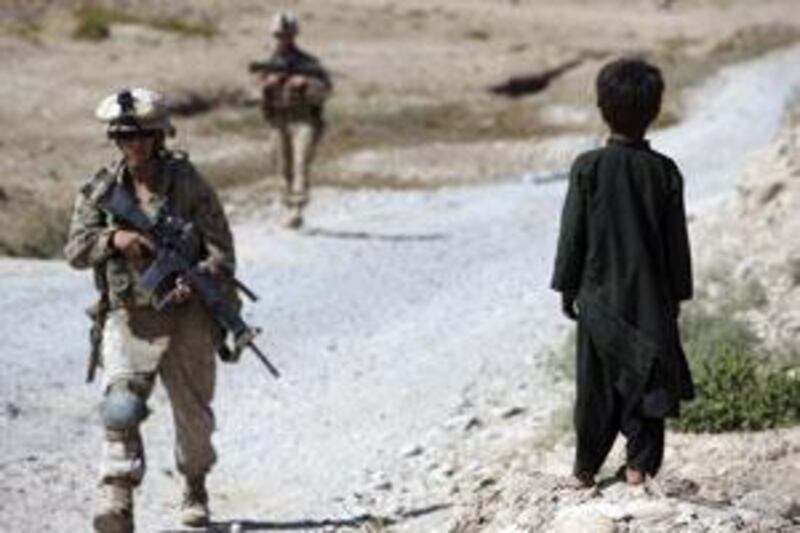KABUL // A large hole marks the spot where Italy suffered its worst losses of the war in Afghanistan. Six soldiers were killed when a suicide bomber attacked their convoy as it headed down the road away from Kabul airport. Ten civilians also died. One afternoon later last month, people had resumed their usual daily business. A filthy, foul-smelling stream lay stagnant near a row of workshops and stores, and children milled about with nothing much to do. "Why did the foreigners come to Afghanistan? If they were not in Afghanistan there would be no suicide attacks," said a passer-by who gave his name only as Naqib. The 2001 US-led invasion was launched eight years ago today amid widespread international support. Soon the Taliban regime crumbled, victory was declared and the world turned its attention elsewhere. Now more than 100,000 foreign troops find themselves bogged down in a war that their commander believes could be lost unless reinforcements are quickly deployed. On the face of it the turnaround has been quite remarkable, but many Afghans saw the trouble coming. "We hope to God that the situation will become even worse here and again we will get weapons," Naqib said, while standing outside a Kabul grocer. "If the Americans didn't have their air force, then within one night we would be able to arrest them in their embassy." The man running the grocery shop was less defiant. A father of four selling onions and potatoes, Babrak Azimi seemed sad when he explained why he wanted the occupation to end. "My daughter is studying school near here and I am worried every morning when she leaves," he said. Looking at the boys hanging around, he added: "These children are sick now. They have mental problems, each one." The attack on the Italians in September was the kind of incident that has become all too common in Afghanistan. On this stretch of road alone there have been a number of suicide bombings, while elsewhere fighting now rages across much of the country. Already 2009 has been the deadliest year of the conflict for foreign troops and, according to UN estimates, civilian casualties rose by 24 per cent in the first six months compared with the corresponding period last year. After a prolonged period of neglect during the previous administration, the war is again at the heart of US foreign policy. After taking office as president, Barack Obama unveiled what at the time was billed as a new strategy for Afghanistan and Pakistan. "The situation is increasingly perilous," he said. Since then thousands of extra troops have been deployed, only to be met with fierce resistance and growing doubts in Washington and London that the war can ever be won. Wadir Safi, a professor at Kabul University and a political analyst, blamed much of the current crisis on past mistakes. "Mr Bush left Afghanistan and attacked Iraq. They cut the resources and personnel - financial resources and human resources - and this gave time for the Taliban and followers of al Qa'eda to reorganise," he said. As well as expanding the occupation militarily, the United States has attempted to emphasise the need for more development, reconciliation with some sections of the insurgency and, crucially, less corruption within the government. There is a sense on the ground, however, that these goals could amount to nothing but talk. Mr Safi, for one, believes that the United States has too often turned a blind eye to the failings of the Afghan president, Hamid Karzai, whose re-election is expected to be confirmed soon, despite allegations of systematic fraud levelled against him since the vote. "If the people are not behind it, this administration is nothing. They are sitting only in their palaces, eating, drinking, sleeping and increasing their wealth," he said. "More soldiers will not work in this situation if first of all the administration is not corrected." Gen Stanley McChrystal, commander of US and Nato forces, is believed to want between 30,000 and 40,000 additional combat troops and trainers to be sent. Without them, he is concerned that the war could be lost within 12 months. Haji Sakhi Mushani, a senator in the upper house of Afghanistan's parliament, likened the problems today with the Soviet occupation, when "some communists agreed with it" but "most people were against it". A representative of the eastern province of Kunar, a Taliban stronghold, Mr Mushani said much of the bloodshed was inevitable the moment the war began. "When the Americans attacked Afghanistan I knew the Afghans would never accept having foreign countries here, whether they were Muslim or infidels. They cannot accept it because they have seen history." csands@thenational.ae
War in Afghanistan: eight years later
Eight years after driving the Taliban from power, Nato's US-led multinational force is facing increasingly fierce resistance.

Editor's picks
More from the national




